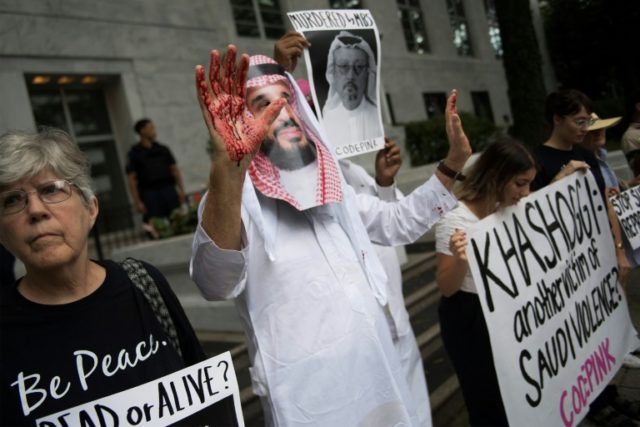CNN reported on Monday that a source “briefed on the investigation” into the October 2 murder of Washington Post contributor Jamal Khashoggi provided some details about the audio recording of Khashoggi’s death, claiming his last words were, “I can’t breathe.”
The source, whose nationality and agency affiliation CNN did not disclose, claims to have reviewed a full transcript of the recording translated into English. CNN evidently did not access the full transcript, but the source gave “the fullest account of the transcript that has so far been published.”
The source said the recording contradicts Saudi Arabia’s official explanation for Khashoggi’s death as a rogue extradition operation gone wrong, but the partial transcript posted by CNN does support that narrative, as it begins with a member of the Saudi team telling Khashoggi, “You are coming back.”
It remains unclear how the scuffle that ensued when Khashoggi resisted ended with his death by suffocation, but at a certain point the attackers seem to have decided they would kill him, and it took quite a bit of determined effort to accomplish the deed:
According to CNN’s source, a voice identified in the transcript as Maher Abdulaziz Mutreb, a former Saudi diplomat and intelligence official working for bin Salman, and known to Khashoggi from their time together at the Saudi Embassy in London, addresses him.
“You are coming back,” the man says.
“You can’t do that,” Khashoggi replies. “People are waiting outside.”
(Khashoggi’s fiancée accompanied him as far as the consulate, with instructions to call associates if he did not emerge.)
Without any further dialogue, according to the source, the transcript indicates that several people set upon Khashoggi.
Noises follow, and very quickly Khashoggi is fighting for air.
One curious detail from the alleged transcript is that Khashoggi repeats “I can’t breathe” three times, which would be unusual for the victim of a deliberate strangulation carried out by several trained military personnel.
The story of Khashoggi’s death that Saudi officials provided has changed several times, but they have claimed on several occasions that he died accidentally during an attempt to drug or physically subdue him. That explanation seems more consistent with Khashoggi repeatedly claiming he cannot breathe and gasping loudly for several minutes, although clearly all efforts to explain the details of a second- or third-hand written translation of the audio evidence of a physical struggle must be taken as conjecture.
“The transcript notes the sounds of Khashoggi’s body being dismembered by a saw, as the alleged perpetrators are advised to listen to music to block out the sound,” CNN reported, addressing a lingering question about the disposal of Khashoggi’s remains.
The only other voice identified by name in the transcript is that of Dr. Salah Muhammad al-Tubaiqi, the forensic medical specialist who infamously traveled to Istanbul with a bone saw. According to the source, Tubaiqi took command of the situation after protracted screaming and gasping, and the sound of his bone saw is soon heard on the tape. He is allegedly the person who told the other Saudi agents to “put your earphones in or listen to music like me” after he went to work with the saw.
The source somewhat ambiguously claimed the transcript “suggests that a series of phone calls are made” after Khashoggi’s death. Turkish officials who reviewed the audio have suggested the calls were made to senior Saudi officials in Riyadh. Saudi officials who have reviewed the transcript insisted to CNN there is no evidence of calls being placed to senior officials by Khashoggi’s murderers.
“The original transcript of the audio was prepared by Turkish intelligence services. Turkish officials have never said how they obtained the audio. The transcript would have been translated before it was shared with other intelligence services; CNN’s source read a translated version and has been briefed on the investigation,” the news network stated.
CNN conceded there is no “smoking gun” in the transcript that would directly tie Saudi Crown Prince Mohammed bin Salman to the Khashoggi killing, but the inside source concluded the events of October 2 were clearly “a planned assassination by an organized team that carried out its job with ruthless efficiency, keeping someone in Riyadh informed at each step.”
Saudi Foreign Minister Adel al-Jubeir stated on Sunday that none of the 19 suspects investigated or detained by Saudi Arabia in connection with Khashoggi’s death will be extradited.
“We don’t extradite our citizens,” Jubeir said when asked about Turkish arrest warrants filed against Saud al-Qahtani and General Ahmed al-Asiri.
Qahtani, a former aide to Crown Prince Mohammed bin Salman, is widely believed to be the official contacted by phone from the Istanbul consulate after Khashoggi’s death. General Asiri was formerly deputy head of Saudi foreign intelligence and has been described by some Saudi officials as the most likely culprit for masterminding the rogue operation to kidnap Khashoggi (or, in the more cynical interpretation of these events, the most plausible scapegoat for the murder).
Qahtani and Asiri were both fired from their positions in the aftermath of Khashoggi’s death. Qahtani was designated for sanctions by the U.S. Treasury Department on November 15, along with nearly every suspected member of the Saudi team dispatched to confront Khashoggi in Istanbul. The Treasury Department accused Qahtani of planning the operation and assigning his subordinate Maher Mutreb – the voice heard telling Khashoggi he was “coming back” in the audio recording – to carry it out.

COMMENTS
Please let us know if you're having issues with commenting.